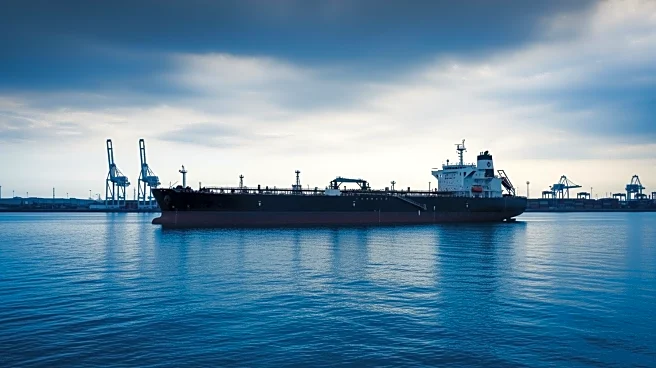What's Happening?
Iranian forces, specifically the Islamic Revolutionary Guard Corps (IRGC), have illegally boarded and seized a Marshall Islands-flagged tanker, M/V Talara, in international waters of the Strait of Hormuz.
The incident occurred on November 14, 2025, when IRGC operatives arrived by helicopter and commandeered the vessel, steering it into Iran's territorial waters. This action by Iran is considered a blatant violation of international law, as it undermines the freedom of navigation and the free flow of commerce. The U.S. Central Command has been monitoring the situation and has called on Iran to provide a legal basis for its actions to the international community.
Why It's Important?
The seizure of the M/V Talara by Iranian forces has significant implications for international maritime security and the stability of global commerce. The Strait of Hormuz is a critical chokepoint for oil transportation, and any disruption in this region can have far-reaching effects on global oil prices and supply chains. The incident highlights ongoing tensions in the region and raises concerns about the safety of commercial vessels navigating these waters. It also underscores the need for international cooperation to ensure the security of maritime routes and uphold international law. The U.S. and its allies may need to increase their vigilance and presence in the region to deter further aggressive actions by Iran.
What's Next?
The U.S. Central Command has stated that it will continue to work alongside partners and allies to promote regional peace and stability. This may involve increased naval patrols and surveillance in the Strait of Hormuz to prevent further incidents. Diplomatic efforts could be initiated to address the violation of international law and seek a resolution that ensures the safe passage of commercial vessels. The international community may also pressure Iran to release the seized tanker and provide assurances against future violations. The situation could lead to heightened diplomatic tensions and potential retaliatory measures if not resolved promptly.
Beyond the Headlines
The incident raises broader questions about Iran's strategic intentions and its willingness to challenge international norms. It may reflect internal political dynamics within Iran, where hardline factions seek to assert their influence through aggressive actions. The seizure could also be a response to perceived threats or sanctions imposed by other nations. Long-term implications may include shifts in regional alliances and increased militarization of key maritime routes. The event underscores the importance of international maritime law and the need for robust mechanisms to enforce compliance and resolve disputes.










